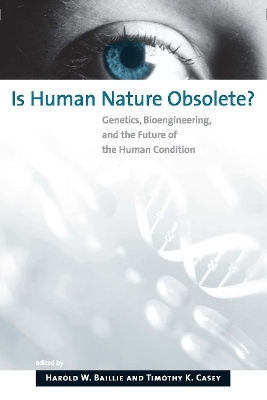
Is Human Nature Obsolete?
Genetics, Bioengineering, and the Future of the Human Condition
Seiten
2004
MIT Press (Verlag)
978-0-262-02569-0 (ISBN)
MIT Press (Verlag)
978-0-262-02569-0 (ISBN)
- Titel ist leider vergriffen;
keine Neuauflage - Artikel merken
An interdisciplinary exploration of whether modern genetics and bioengineering are leading us to a posthuman future.
As our scientific and technical abilities expand at breathtaking speeds, concern that modern genetics and bioengineering are leading us to a posthuman future is growing. Is Human Nature Obsolete? poses the overarching question of what it is to be human against the background of these current advances in biotechnology. Its perspective is philosophical and interdisciplinary rather than technical; the focus is on questions of fundamental ontological importance rather than the specifics of medical or scientific practice.
The authors-all distinguished scholars in their fields-take on questions about technology's goals and values that are often ignored or sidelined in the face of rapid scientific advances and the highly specialized nature of technical knowledge. The essays included represent a rich variety of thought, ranging from finely nuanced philosophical and theological arguments to historical studies and cultural commentaries. Several explore the historical background of today's biotechnology: Timothy Casey traces such developments as the emergence of cybernetic humanity from Cartesian dualism, and Diane Paul presents the history of "positive" versus coerced eugenics. Jean Bethke Elshtain discusses cloning as a "messianic project" to perfect the body and exclude natural diversity-giving as an example the elimination of Down Syndrome as an acceptable human type-while Harold Baillie calls for an examination of the metaphysical roots of personhood. Robert Proctor finds no evidence in paleontology for any "essence of humanity," and Tom Shannon argues against materialist reductionism. Addressing social concerns, Lisa Sowle Cahill finds the possibility of a political solution to the problems raised by genetic engineering in Catholic teachings on social justice, and Langdon Winner looks critically at the "scientific enthusiasts of a posthuman future." Taken as a whole, the book provides a humanistic overview of a subject too often considered only in its technological aspect.
As our scientific and technical abilities expand at breathtaking speeds, concern that modern genetics and bioengineering are leading us to a posthuman future is growing. Is Human Nature Obsolete? poses the overarching question of what it is to be human against the background of these current advances in biotechnology. Its perspective is philosophical and interdisciplinary rather than technical; the focus is on questions of fundamental ontological importance rather than the specifics of medical or scientific practice.
The authors-all distinguished scholars in their fields-take on questions about technology's goals and values that are often ignored or sidelined in the face of rapid scientific advances and the highly specialized nature of technical knowledge. The essays included represent a rich variety of thought, ranging from finely nuanced philosophical and theological arguments to historical studies and cultural commentaries. Several explore the historical background of today's biotechnology: Timothy Casey traces such developments as the emergence of cybernetic humanity from Cartesian dualism, and Diane Paul presents the history of "positive" versus coerced eugenics. Jean Bethke Elshtain discusses cloning as a "messianic project" to perfect the body and exclude natural diversity-giving as an example the elimination of Down Syndrome as an acceptable human type-while Harold Baillie calls for an examination of the metaphysical roots of personhood. Robert Proctor finds no evidence in paleontology for any "essence of humanity," and Tom Shannon argues against materialist reductionism. Addressing social concerns, Lisa Sowle Cahill finds the possibility of a political solution to the problems raised by genetic engineering in Catholic teachings on social justice, and Langdon Winner looks critically at the "scientific enthusiasts of a posthuman future." Taken as a whole, the book provides a humanistic overview of a subject too often considered only in its technological aspect.
Harold W. Baillie is Professor of Philosophy at the University of Scranton. Timothy K. Casey is Professor of Philosophy at the University of Scranton.
| Erscheint lt. Verlag | 8.10.2004 |
|---|---|
| Reihe/Serie | Basic Bioethics |
| Zusatzinfo | 1 illus. |
| Verlagsort | Cambridge, Mass. |
| Sprache | englisch |
| Maße | 152 x 229 mm |
| Gewicht | 703 g |
| Themenwelt | Geisteswissenschaften ► Philosophie ► Ethik |
| Medizin / Pharmazie ► Medizinische Fachgebiete ► Medizinethik | |
| Studium ► Querschnittsbereiche ► Geschichte / Ethik der Medizin | |
| ISBN-10 | 0-262-02569-8 / 0262025698 |
| ISBN-13 | 978-0-262-02569-0 / 9780262025690 |
| Zustand | Neuware |
| Haben Sie eine Frage zum Produkt? |
Mehr entdecken
aus dem Bereich
aus dem Bereich
Die Geschichte eines Weltzentrums der Medizin von 1710 bis zur …
Buch | Softcover (2021)
Lehmanns Media (Verlag)
CHF 27,90
von der Antike bis zur Gegenwart
Buch | Softcover (2024)
C.H.Beck (Verlag)
CHF 16,80
Krankheitslehren, Irrwege, Behandlungsformen
Buch | Softcover (2024)
C.H.Beck (Verlag)
CHF 55,90


